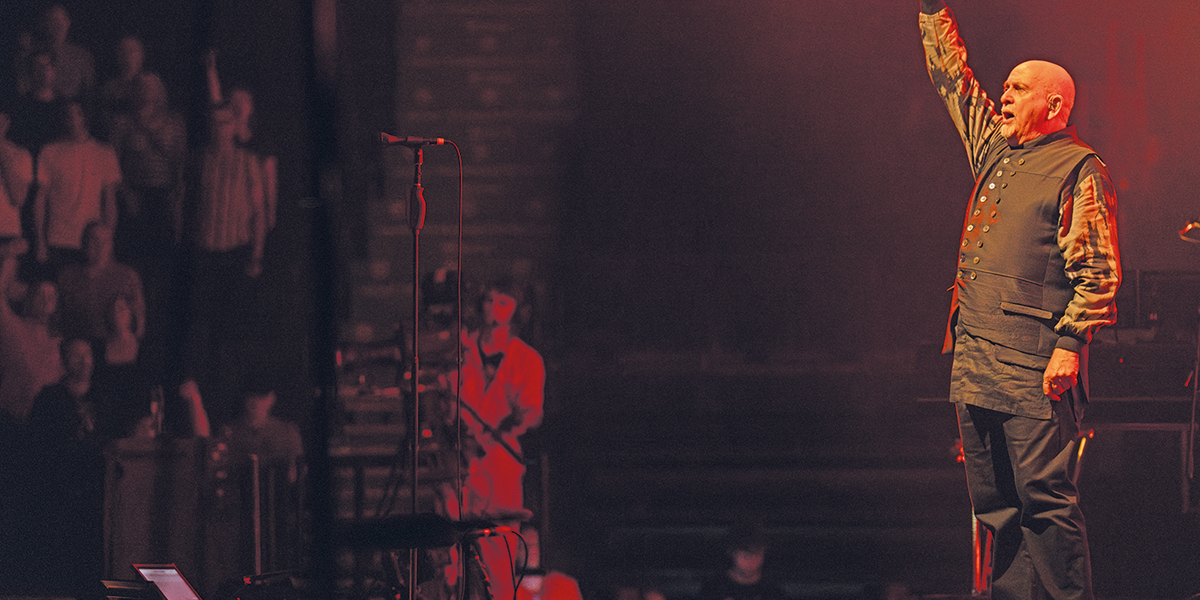Thursday, July 18, 2024
Peter Gabriel Discusses ‘Biko’, His Anti-Apartheid Anthem
In 1980 Peter Gabriel released ‘Biko’, raising awareness of South Africa’s apartheid regime. It’s since become a human rights anthem across the world. Gabriel tells the story of its genesis and legacy

Peter Gabriel performing ‘Biko’ during the i/o tour, 2023 (photo: York Tillyer)
On September 12, 1977, Bantu Stephen Biko was killed in custody by the South African police. “What was shocking to me was that there had been a fair amount of international publicity about his arrest which I had wrongly assumed would protect him from being killed,” remembers Peter Gabriel. Biko was the national leader of South Africa’s Black Consciousness Movement, an anti-apartheid and Black liberation movement which was being increasingly persecuted by the country’s government from the late 60s through to the 70s. In 1973, Biko was subject to a banning order which restricted his movement and forbade him from speaking publicly. It was during a violation of this ban in 1977 that Biko was arrested by police, with injuries sustained during interrogations leading to his death in a prison cell days later.
Gabriel was moved to create “a response to what was happening in South Africa.” Asked whether he was inspired by other protest songs, he says: “I really wanted to create something that sounded fresh and had an African influence. I’d also been influenced by the work of Dollar Brand, now Abdullah Ibrahim, the South African pianist and composer.”
After a month writing the basic song, it took “the best part of a year” for Gabriel to “upgrade lyrics” and work on the recording for what became ‘Biko’. He recalls: “The process began with a rhythm which was programmed onto the world’s first drum machine, the PAiA. Then I wanted to keep something super simple so that the focus would be on the words. The scream at the beginning, which was from the remarkable David Ferguson (David Rhodes’ former bandmate in Random Hold), set up the mood beautifully followed by David [Rhodes]’s crashing guitar chords. I was also wanting to create a chant at the end that might be uplifting and rousing and be useful for the anti-apartheid campaign.”
‘Biko’ was released as a single in 1980, reaching #38 in the UK charts, with all proceeds being donated to the Black Consciousness Movement. The song would appear later that year on Gabriel’s third self-titled album (known as Melt), though its presence contributed to Atlantic Records (US), then run by Ahmet Ertegun, refusing to distribute it: “I was a big fan of Ahmet’s so being dropped was a painful experience,” recalls Gabriel. “It wasn’t so much censorship as he thought the record had very little commercial appeal. There was a song called ‘Lead a Normal Life’ about mental health and Ahmet’s feeling was that no one in America wanted to have entertainers talking about mental health or what was going on in South Africa. In his words, ‘Who’s gonna be interested in that?’” The decision “made it much more attractive as a weapon of protest and it was sung on many campuses,” adds Gabriel.
Sure enough, the song paved the way for a global anti-apartheid movement, soon followed by songs such as The Special AKA’s ‘Nelson Mandela’ and Artists United Against Apartheid’s ‘Sun City’ as pressure mounted on international governments to stop supporting the regime, which the US and UK only did in the mid-80s. Gabriel would perform the song during two tours organised by Amnesty International: A Conspiracy of Hope in 1986 and Human Rights Now! in 1988. “It became a human rights anthem on [those] tours,” muses Gabriel. “Some activists have [told me] that hearing that song sung by hundreds of people was an emotional trigger point that led them to their careers.”
Apartheid officially ended in 1994 with Nelson Mandela becoming the country’s first democratically elected president. Does Gabriel think music played a role? “Clearly there were many factors at work but music had a role in informing the world of the horrific situation in South Africa. So, while music can’t directly bring change, it can inform and influence people to then play a role in making change happen.” ‘Biko’ has been covered multiple times, with versions by Robert Wyatt, Paul Simon, Silkroad Ensemble and Playing for Change. “The song outgrew what I ever expected and became one of the human rights anthems, which unfortunately are still as needed and relevant as at the time of creation.”
In 2003, Gabriel was invited to perform in Cape Town, South Africa at the first of several 46664 concerts to raise awareness of HIV/AIDS. What does he remember about performing the song in the country that inspired it? “Although the Black Consciousness Movement was in some sense a rival to the ANC [African National Congress, Mandela’s party], I always used to get shivers down my spine performing in front of Mandela, Archbishop Tutu and Steve Biko’s family, thinking of what they’d been through. Partly as a result of the musical connections I’ve made since that song, South African music has a big place in my heart, especially the Soweto Gospel Choir, with whom I’ve worked on many occasions.”
As told by Russ Slater Johnson
This article originally appeared in the August/September 2024 issue of Songlines. Never miss an issue – subscribe today

